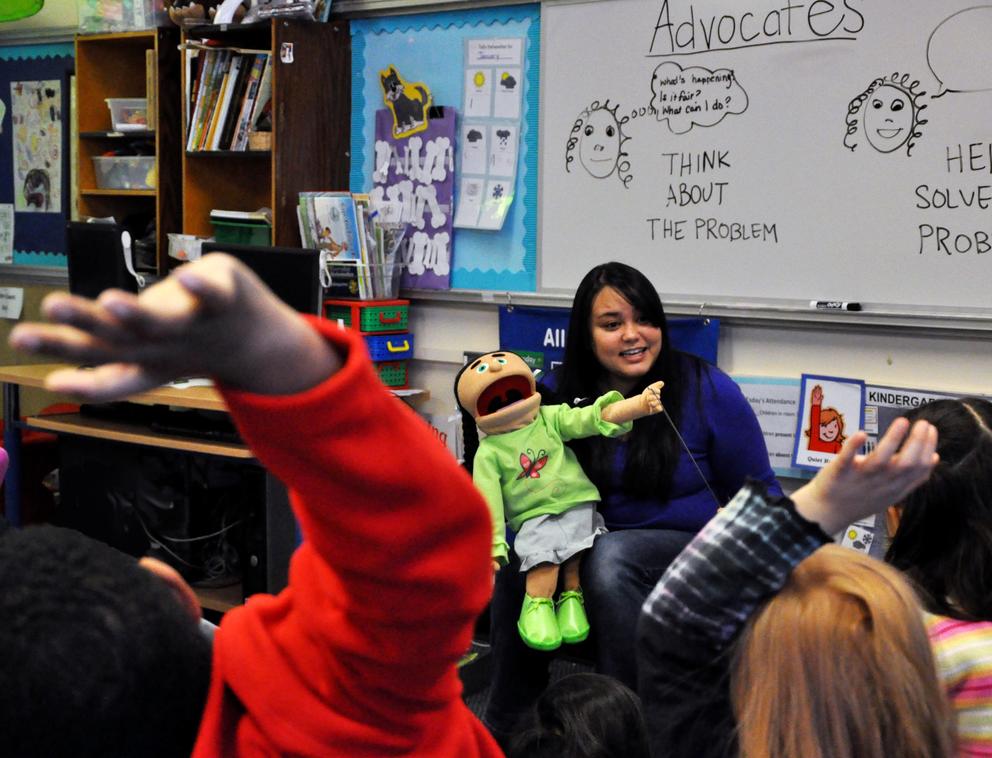Supporters of the Experimental Education Unit – a program of the University of Washington aimed at offering inclusive educations for young children with special needs – poured into a Seattle School Board meeting Wednesday night to express dismay with a decision to cut funding to the unique kindergarten program. The 36-student kindergarten has been contracted with Seattle Public Schools for three decades.
The EEU, which also includes a pre-school, is nationally recognized for its approach to education, creating classrooms that blend students with and without developmental disabilities. It serves as a top-of-the-line training ground for young special educations teachers. Many of the graduate students who get their start here have gone off to teach in the district, state, and even across the nation, EEU staff say.
Against a backdrop of colorful signs and anxious parents, Director of Special Education Wyeth Jessee backpedaled from his office's previous position. In a several-minute address, he told board members that he is interested in finding a way to save the program, which operates out of the University of Washington.
“Our intent is not to close the kindergarten, but to work in partnership with [the University of Washington] to find a solution,” he said.
Last month, EEU staff told Crosscut that they had learned of the kindergarten’s potential demise for the first time on Dec. 7. Director Ilene Schwartz described it as being “blindsided.” At that point, EEU leadership was asked to inform parents with children in the program’s preschool that the kindergarten would not exist the following year. There would be no opportunity, it seemed, for EEU staff to try and come up with a solution.
Jordan Taitingfong, an EEU kindergarten teacher, says she was “shocked” to hear Jessee claim the program could be saved from the chopping block.
SPS representatives maintain that they alerted EEU to complications regarding the program’s funding several times over the last three years. Conversations allegedly began in 2013 when a state auditor issued a verbal heads-up to the school district, warning them that funds for the kindergarten might be inappropriately placed. The problem, the district says, involves the young beneficiaries of funding earmarked for special education: the fact the classes include kids with and without developmental disabilities complicates things, since general education students are also benefitting from that money.
SPS also claims that the kindergarten – and particularly its extensive personnel resources – is too difficult to replicate in mainstream classrooms, creating an unfair situation for the kids who can’t access EEU’s services.
According to Schwartz, none of these conversations indicated that the kindergarten’s contract was in jeopardy. “We never had any idea that these issues would cause them to discontinue the contract,” she says. “We’ve always said, ‘We’re willing to work with you on what the problem is.’”
Now, on the heels of Wednesday's meeting, the EEU will have that opportunity. Members of a sympathetic Seattle School Board say they will do what they can to reverse the decision to cut the program, and to support funding alternatives.
“I refuse to believe that an asset like the EEU would be at peril as a result of accounting errors, or lack of management oversight, or whatever it is that is the cause of the problem,” said school board member Stephan Blanford. “My hope and my expectation is that we will get to a solution that will leave everybody satisfied.”
Nearly all board members – including Scott Pinkham, whose child is an EEU graduate – echoed this sentiment.
In a heartfelt and sometimes-tearful public testimony, parents shared stories about their experience with EEU.
Lauralynn Dixon’s son, Ted, who is on the autism spectrum, currently attends the EEU’s preschool. She held up a photo of her little boy for the school board to see. In it, he’s making an emergency phone call on behalf of a sick classmate. Dixon was shocked when she first saw that picture; she had no idea Ted knew how to call an ambulance.
But even more heartening was a much simpler fact: he was finally playing with other kids.
At previous schools, Ted acted out and spent time on the couch, sucking his thumb. His disruptive behavior got so bad, Dixon said, that she had to reduce his schedule to half days. Sad and confused, Ted thought he had done something wrong as his young peers settled into lunch while he headed home.
It took four months for Ted to be evaluated and ultimately placed in a developmental preschool. When he finally was, only more bad news. In his class of ten, just one peer was without special needs.
“We had gone from being isolated to being segregated,” Dixon said.
Then they found the EEU, where kids with and without special needs played and learned side by side. “It’s not fair that some kids have access to this wonderful program and some kids don’t,” Dixon said. “So why not make EEU the model for other schools?”
Now, with a seeming commitment of support from the Seattle School Board and district, it appears that the EEU is situated to find a solution. Schwartz is hopeful that fresh thinking on funding may allow them to “think bigger” about the kindergarten and its future.
But other challenges remain. Moving forward there will need to be efforts to rebuild trust between the program and the district. It is still unclear who made the decision to cut the kindergarten in the first place.
“And we may not ever know,” Schwartz says.



